高二英语上学期Unit 7c
- 格式:doc
- 大小:42.00 KB
- 文档页数:4

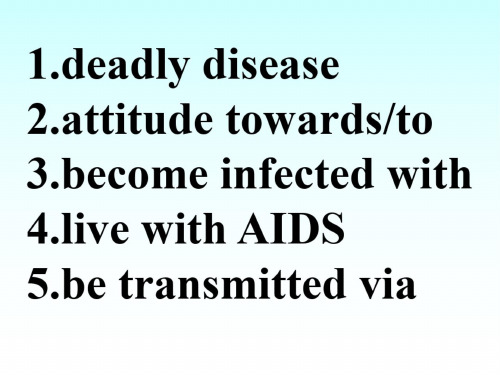

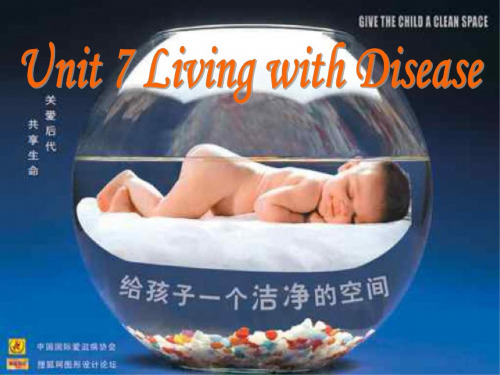
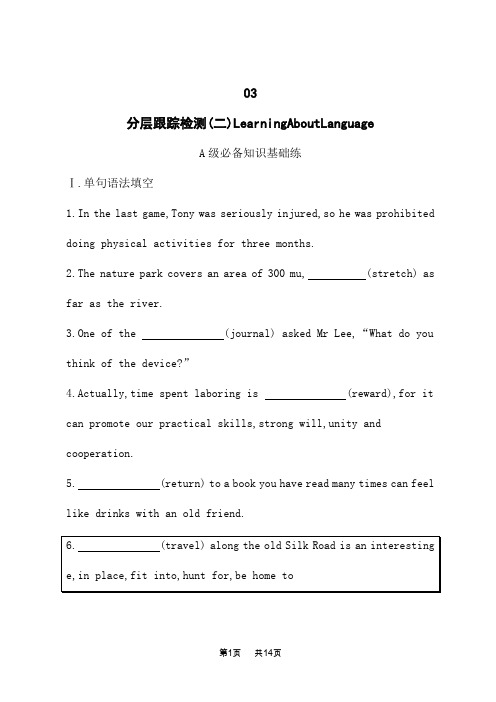
03分层跟踪检测(二)LearningAboutLanguageA级必备知识基础练Ⅰ.单句语法填空1.In the last game,Tony was seriously injured,so he was prohibited doing physical activities for three months.2.The nature park covers an area of 300 mu, (stretch) as far as the river.3.One of the (journal) asked Mr Lee,“What do you think of the device?”4.Actually,time spent laboring is (reward),for it can promote our practical skills,strong will,unity and cooperation.5. (return) to a book you have read many times can feel like drinks with an old friend.1.What made him amazed was that those houses in this areathe natural environment.2.Susan declined the job offer,for the company washer house.3.Our universe countless galaxies,with each galaxy hosting hundreds of billions of stars.4.The villagers have to go to the mountainwater because of the drought.5.This afternoon,I collected all the books,newspapers and other things scattered in the rooms and put them . Ⅲ.单句写作1.目前我市正在建的主题公园是你们市的主题公园的三倍大。
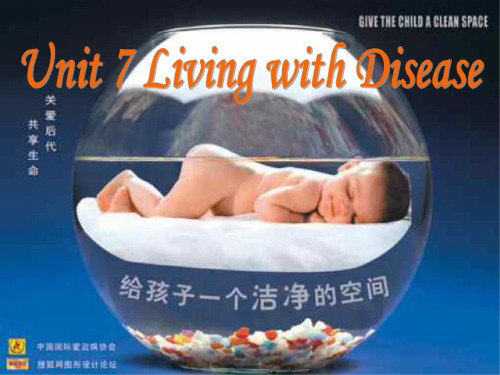

人教版高二(上)英语知识清单:重点短语和重点句子unit7-8(人教版高二英语上册教案教学设计)一重点短语1 break down(机器)坏掉,(人)垮掉,(谈判,计划)失败,分解联想:break up分散,(关系)破裂 break through 突破break in(vi.)闯入,插嘴break into(vt.)闯入;突然大哭/大笑 break off中断,折断 break away from摆脱2 leave sb/sth alone不理会 leave sth behind遗留;留下 leave out 遗漏,漏掉leave +n.+adj/adv. 使…处于某种状态eg,He question left me speechless. Don’t leave your work half done.She left her baby crying. Leave them as they are.3 defend/protect … against(from)保护…免受…4 keep sb/sth alive让…生存,保留下来 come alive活跃起来5 cure sb of sth 治愈某人的疾病;改掉某人的恶习eg,Moving to the countryside cured her of asthma.搬到乡下他的哮喘就好了。
eg,The painful lesson cured him of the bad habit of drinking and driving.那次惨痛的教训根除了他酒后驾车的坏毛病。
6 be infected with/contract disease感染疾病 transmit/spread disease传播疾病(feelings)infect sb情绪感染某人eg,Her enthusiasm infected the whole class.7 blood transfusion输血8 because of a lack of/for lack of/in the absence of 因为缺乏9 as with/as is the case with/in common with同…一样10 the+adj.表示一类人:the young(=young people) ,the rich(富人),the poor(穷人)the dead(死者),the living,(生者),the accused(被告)表示抽象化事物:the beatuiful(=beauty)美的事物,the impossible不可能的事情11 suffer from (a disease)患有某种疾病eg, suffer from a bad cold/loss of memory/somnia患重感冒,失忆症,失眠suffer+n. 遭受,经历(痛苦,损失)eg, suffer pain/torture/defeat/damage/loss遭受痛苦,折磨,失败,破坏,损失12 be available 可获得的,可用的;有空的,不忙的eg,The library is available for the students. 图书馆对学生开放。
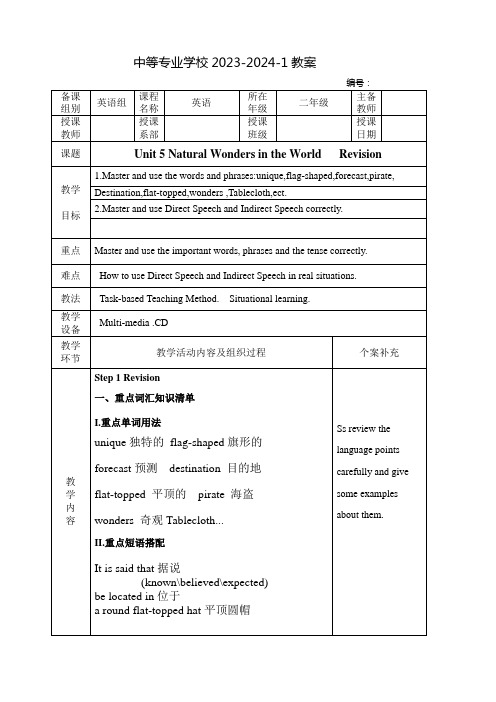
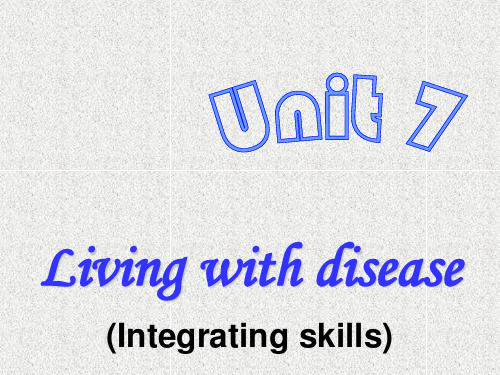

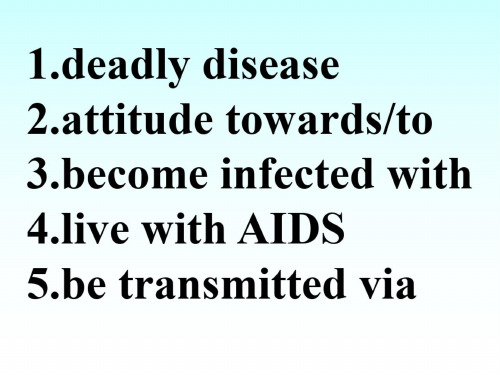
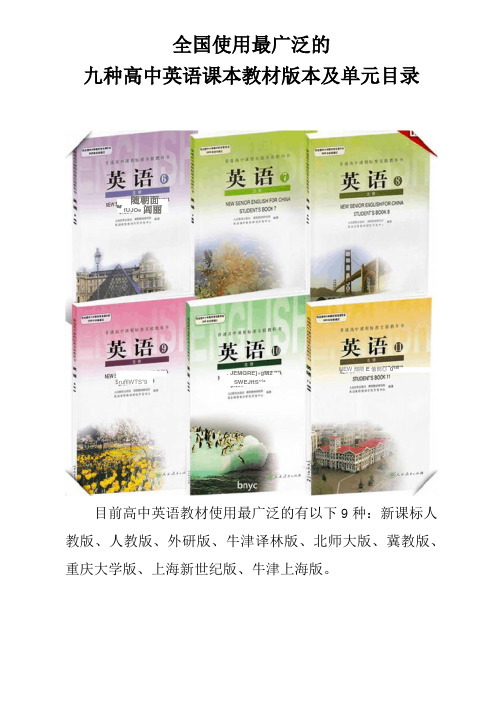
全国使用最广泛的九种高中英语课本教材版本及单元目录目前高中英语教材使用最广泛的有以下9种:新课标人 教版、人教版、外研版、牛津译林版、北师大版、冀教版、 重庆大学版、上海新世纪版、牛津上海版。
随朝面0f fUJOe 闾丽$ruffiWTS"9 . JEMQRE]«gM2 SWEJftS*1a NEW 部限E 值冏◎ 01M一、高中英语教材人教版单元目录人教版高一上学期Unit 1 Good friendsUnit 2 English around the worldUnit 3 Going placesUnit 4 Unforgettable experiencesUnit 5 The silver screenUnit 6 Good mannersUnit 7 Cultural relicsUnit 8 SportsUnit 9 TechnologyUnit 10 The world around usUnit 11 The sounds of the worldUnit 12 Art and literature人教版高一下学期Unit 13 Healthy eatingUnit 14 FestivalsUnit 15 The necklaceUnit 16 Scientists at workUnit 17 Great womenUnit 18 New ZealandUnit 19 Modern agricultureUnit 20 HumourUnit 21 Body languageUnit 22 A world of fun人教版高二上学期Unit 1 Making a differenceUnit 2 New mediaUnit 3 Art and architectureUnit 4 A garden of poemsUnit 5 The British IslesUnit 6 Life in the futureUnit 7 Living with diseaseUnit 8 First aidUnit 9 Saving the earthUnit 10 Frightening nature人教版高二下学期Unit 11 Scientific achievementsUnit 12 Fact and fantasyUnit 13 The water planetUnit 14 Freedom fightersUnit 15 DestinationsUnit 16 The United States of America Unit 17 DisabilitiesUnit 18 InventionsUnit 19 The Merchant ofVeniceUnit 20 Archaeology人教版高三学期Unit 1 That must be a record!Unit 2 Crossing limitsUnit 3 The land down underUnit 5 Getting the messageUnit 7 A Christmas CarolUnit 8 Learning a foreign languageUnit 9 Health careUnit 10 American literatureUnit 11 Key to successUnit 12 EducationUnit 13 The mystery of the MoonstoneUnit 14 ZoologyUnit 15 Popular youth cultureUnit 16 Finding jobs二、高中英语教材新课标人教版单元目录新课标人教版高一上模块1、2模块1 Unit 1 Friendship模块1 Unit 2 English around the world模块1 Unit 3 Travel journal模块1 Unit 4 Earthquakes模块1 Unit 5 Nelson Mandel -- a modern hero模块2 Unit 1 Cultural relics模块2 Unit 2 The Olympic Games模块2 Unit 3 Computers模块2 Unit 4 Wildlife Protection模块2 Unit 5 Music新课标人教版高一下模块3、4模块3 Unit 2 Healthy eating模块3 Unit 3 The Million Pound Bank Note模块3 Unit 4 Astronomy: the science of the stars 模块3 Unit 5 Canada - “The True North”模块4 Unit 1 Women of achievement模块4 Unit 2 Working the land模块4 Unit 3 A taste of English humour模块4 Unit 4 Body language模块4 Unit 5 Theme parks新课标人教版高二上模块5、6模块5 Unit 1 Great Scientists模块5 Unit 2 The United Kingdom模块5 Unit 3 Life in the future模块5 Unit 4 Making the news模块5 Unit 5 First Aid模块6 Unit 1 Art模块6 Unit 2 Poems模块6 Unit 3 A healthy life模块6 Unit 4 Global warming模块6 Unit 5 The power of nature新课标人教版高二下模块7、8选修模块7 Unit 1 Living well选修模块7 Unit 2 Robots选修模块7 Unit 3 Under the sea选修模块7 Unit 4 Sharing选修模块7 Unit 5 Travelling abroad选修模块8 Unit 1 A land of diversity选修模块8 Unit 2 C loning选修模块8 Unit 3 Inventors and inventions 选修模块8 Unit 4 Pygmalion选修模块8 Unit 5 Meeting your ancestors新课标人教版高三学期模块9、10选修模块9 Unit 1 Breaking records选修模块9 Unit 2 Sailing the oceans选修模块9 Unit 3 Australia选修模块9 Unit 4 Exploring planets选修模块9 Unit 5 Inside advertising选修模块10 Unit 1 Nothing ventured选修模块10 Unit 2 King Lear选修模块10 Unit 3 Fairness for all选修模块10 Unit 4 Learning effectively选修模块10 Unit 5 Enjoying novels三、高中英语教材外研版单元目录必修1Module 1 My First Day at Senior HighModule 2 My New TeachersModule 3 My First Ride on a TrainModule 4 A Social Survey -- My Neighbourhood Module 5 A Lesson in a LabModule 6 The Internet and Telecommunications必修2Module 1 Our Body and Healthy HabitsModule 2 No DrugsModule 3 MusicModule 4 Fine Arts - Western, Chinese and Pop Arts Module 5 NewspapersModule 6 Films and TV ProgrammesModule 7 Revision必修3Module 1 EuropeModule 2 Developing and Developed CountriesModule 3 The Violence of NatureModule 4 Sandstorms in AsiaModule 5 Great people and Great InventionModule 6 Old and NewModule 7 Revision必修4Module 1 Life in the futureModule 2 Traffic JamModule 3 Body Language and Non-Verbal Communication Module 4 Great ScientistsModule 5 A Trip Along the Three GorgesModule 6 Unexplained Mysteries of the Nature World Module 7 Revision必修5Module 2 A Job Worth DoingModule 3 Adventure in Literature and the Cinema Module 4 CarnivalModule 5 The Great Sports PersonalityModule 6 Animals in DangerModule 7 Revision外研版第五册综合选修6Module 1 Small TalkModule 2 Fantasy Literature - Philip Pullman Module 3 Interpersonal Relationships -- Friendship Module 4 MusicModule 5 CloningModule 6 War and PeaceModule 7 Revision选修7Module 1 BasketballModule 2 Highlights of My Senior YearModule 3 LiteratureModule 4 Music Born in AmericaModule 5 Ethnic CultureModule 6 The World’s Cultural HeritageModule 7 Revision选修8Module 1 Deep SouthModule 3 Foreign FoodModule 4 Which English?Module 5 The Conquest of the UniverseModule 6 The Tang PoemsModule 7 Revision选修9Module 1 Bernard Shaw’’s PygmalionModule 2 DNA- the Secret of LifeModule 3 The Qin Tomb and the Terracotta Warriors Module 4 Languages of the WorldModule 5 The First AmericansModule 6 Why Do We Need DictionariesModule 7 Revision选修10Module 1 Pride and PrejudiceModule 2 Australia and New ZealandModule 3 Slavery and the American Civil War Module 4 The Magic of FilmModule 5 High-tech LivingModule 6 The Maple Leaf CountryModule 7 Revision选修11Module 1 The Boston Tea PartyModule 2 The Long Walk to FreedomModule 3 Ernest HemingwayModule 4 Sherlock HolmesModule 6 The Unitde NationsModule 7 Revision四、高中英语教材牛津译林版单元标题牛津版高一上学期School life模块1 Unit1模块1 Unit 2 Growing pains模块1 Unit 3 Looking good, feeling good模块2 Unit 1 Tales of the unexplained模块2 Unit 2 Wish you were here模块2 Unit 3 Amazing people牛津版高一下学期模块3 Unit 1 The world of our senses模块3 Unit 2 Language模块3 Unit 3 Back to the past模块4 Unit 1 Advertising模块4 Unit 2 Sporting events模块4 Unit 3 Tomorrow’s world牛津版高二上学期模块5 Unit 1 Getting along with others模块5 Unit 2 The environment模块5 Unit 3 Science versus nature模块6 Unit 1 Laughter is good for you模块6 Unit 2 What is happiness to you?模块6 Unit 3 Understanding each other模块6 Unit 4 Helping people around the world牛津版高二下学期模块7 Unit 1 Living with technology模块7 Unit 2 Fit for life模块7 Unit 3 The world online模块7 Unit 4 Public transport模块8 Unit 1 The written world模块8 Unit 2 The universal language模块8 Unit 3 The world of colours and light模块8 Unit 4 Films and film events牛津版高三上学期模块9 Unit 1 Other countries, other cultures模块9 Unit 2 Witnessing time模块9 Unit 3 The meaning of colour模块9 Unit 4 Behind beliefs模块10 unit 1 building the future模块10 unit 2 people on the move模块10 unit 3 protecting ourselves模块10 unit 4 law and order模块11 unit 1 careers and skills模块11 unit 2 getting a job模块11 unit 3 the secret of success模块11 unit 4 the next step 第一轮复习牛津版高三下学期二轮复习五、高中英语教材北师大版单元标题北师大版高一上学期模块1 Unit 1 Lifestyles模块1 Unit 2 Heroes模块1 Unit 3 Celebration模块2 Unit 4 Cyberspace模块2 Unit 5 Rhythm模块2 Unit 6 Design模块1 复习模块2 复习北师大版高一下学期模块3 Unit 7 The Sea模块3 Unit 8 Adventure模块3 Unit 9 Wheels模块3 复习模块4 Unit 10 Money模块4 Unit 11 The Media模块4 Unit 12 Culture Shock 模块4 复习北师大版高二上学期模块5 Unit 13 People模块5 Unit 14 Careers模块5 Unit 15 Learning模块5 综合或复习模块6 综合或复习模块6 Unit 16 Stories模块6 Unit 17 Laughter模块6 Unit 18 Beauty北师大版高二下学期选修模块7 Unit 19 Language选修模块7 Unit 20 New Frontiers选修模块7 Unit 21 Human Biology选修模块8 Unit 22 Environmental Protection选修模块8 Unit 23 Conflict选修模块8 Unit 24 Society北师大版高三学期选修模块9 Unit 25 Going Global选修模块9 Unit 26 Emotions选修模块9 Unit 27 Behaviour选修模块10 Unit 28 Health选修模块10 Unit 29 Education选修模块10 Unit 30 Relationships选修模块11 Unit 31 Personal Preferences选修模块11 Unit 32 Modern Living选修模块11 Unit 33 Truth and Lies六、高中英语教材冀教版单元标题必修模块1Unit 1 Being a TeenagerUnit 2 FriendshipUnit 3 Men and Women Different Roles in Society Unit 4 Movies from the East, Views from the West Unit 5 Literature:The Dream KeeperUnit 6 Learning through TravelUnit 7 To Your Good HealthUnit 8 New ideas and Inventions必修模块2Unit 1 School LifeUnit 2 FamilyUnit 3 Keeping SafeUnit 4 Let’s Talk MusicUnit 5 Experiencing LiteratureUnit 6 Planning a TripUnit 7 Culture and Cultural Diversity Unit 8 The Story of English必修模块3Unit 1 What Kind of Learner Am IUnit 2 Food for ThoughtUnit 3 The ComputerUnit 4 Attitudes towards our Elders Unit 5 Literature for IdentityUnit 6 GeographyUnit 7 New waves of TechnologyUnit 8 Protecting the Environment必修模块4Unit 1 What shapes our Identity?Unit 2 Using the InternetUnit 3 New Discoveries in Science Unit 4 The Olympic GamesUnit 5 Literature for HappinessUnit 6 Confucius and To day’s SocietyUnit 7 Teenagers, Fashion and Advertising Unit 8 Celebrities and Role Models必修5Unit 1 Exploring Learning ResourcesUnit 2 Managing Your TimeUnit 3 The Story of SuccessUnit 4 Literature for TruthUnit 5 Words and How We Use ThemUnit 6 Teenagers and TelevisionUnit 7 Studying Abroad: What You Need to Know Unit 8 Planning Your Career选修6Unit 1 Achieving Your BestUnit 2 Relieving stress in Your LifeUnit 3 Chinese ExperiencesUnit 4 What’s Being Gifted?Unit 5 Great ScientistsUnit 6 The Great WallUnit 7 Family FestivalsUnit 8 Science Fiction选修7Unit 1 Health MattersUnit 2 Global WarmingUnit 3 Qi Baishi and chinese paintingUnit 4 Self controlUnit 5 Literature for self-under-standing Unit 6 Exploring chinatownUnit 7 Sherlock HolmesUnit 8 Rules Are Rules!选修8Unit 1 Educational ExchangeUnit 2 The Changing English LanguageUnit 3 The Rise of BioengineeringUnit 4 George WashingtonUnit 5 Literature: Poems by and for the PeopleUnit 6 Manners, Customs and CulturesUnit 7 Caring for Each OtherUnit 8 Humankind and Nature选修9Unit 1 Growing UpUnit 2 Literature For LoveUnit 3 Organtic Food and FarmingUnit 4 WeatherUnit 5 MisunderstandingsUnit 6 Ludwig Van BeethovenUnit 7 The Story of TroyUnit 8 Technology and Modern Way of Life选修10Unit 1 Martin Luther King and the Civil Rights Movement Unit 2 Travelling in ChinaUnit 3 CloningUnit 4 EarthquakesUnit 5 Chinese MedicineUnit 6 Literature of DilemmaUnit 7 Fables, Legends and MythsUnit 8 What Can We Do to Protect Our Environment?七、高中英语教材重庆大学版单元标题重庆大学版高一上学期I、Unit 1 Our SchoolsUnit 2 TeachersUnit 3 SchoolmatesUnit 4 SportsUnit 5 MusicUnit 6 FilmsUnit 7 Food and HealthUnit 8 Houses and LivingUnit 9 Clothes and FashionII、Unit 1 Learning English ReadingUnit 2 DictionaryUnit 3 The Story of Helen KellerUnit 4 ConfidenceUnit 5 HonestyUnit 6 Helping PeopleUnit 7 HolidaysUnit 8 FoodUnit 9 Travel重庆大学版高一下学期m、Unit 1 Friends and FriendshipUnit 2 Between Parents and UsUnit 4 DreamsUnit 5 Wishes and AmbitionsUnit 6 PerseveranceUnit 7 ArtUnit 8 DramaUnit 9 Poetryw、Unit 1 Project HopeUnit 2 Three GorgesUnit 3 Countries and RegionsUnit 4 PlantsUnit 5 AnimalsUnit 6 Man and PetsUnit 7 NeighborhoodUnit 8 WorkplaceUnit 9 Living Today重庆大学版高二上学期V、Unit 1 History of the Olympic Games Unit 2 Famous People in the OlympicsUnit 3 Beijing 2008Unit 4 The Planet We Live onUnit 5 History and PeopleUnit 6 Antarctica and the Environment Unit 7 The Internet and Our LifeUnit 8 Magic InternetUnit 9 Computers and the Web w、Unit 1 The Coqui in HawaiiUnit 2 Troublesome TravelersUnit 3 Seeking AdviceUnit 4 A Good Heart to Lean on Unit 5 I Have a DreamUnit 6 A Day’s Wait重庆大学版高二下学期皿、Unit 1 Getting Along with Parents Unit 2 Getting Along with Others Unit 3 HistoryUnit 4 CivilizationUnit 5 Stress and MemoryUnit 6 Dreams Reading皿Unit 1 NamesUnit 2 Non-verbal Communication Unit 3 Going HomeUnit 4 Man of VirtueUnit 5 Wonders of Our BodyUnit 6 Experiencing the Wonders重庆大学版高三学期IX、Unit 1 Chicken Soup for the Soul Unit 2 Eternal LoveUnit 3 Holidays and FestivalsUnit 4 The Delights of BooksUnit 5 Traveling WorldwideUnit 6 Entertaining UsX、Unit 1 About EnglishUnit 2 Life as a PoemUnit 3 Mass MediaUnit 4 MannersUnit 5 Speaking SkillsUnit 6 Beauty of NatureXI、Unit 1 Movie and MusicUnit 2 SpaceUnit 3 World of MysteriesUnit 4 Popular CultureUnit 5 How to Do ThingsUnit 6 Job and Interview八、高中英语教材上海新世纪版单元标题高一上册Unit 1 occupationsUnit 2 Success storiesUnit 3 English mannersUnit 4 Holidays and festivalsUnit 5 Animal friendsUnit 6 Cartoons and comic stripsUnit 7 MetropolisesUnit 8 HackingUnit 9 Personal hygieneMoudle 1综合Moudle 2综合Moudle 3综合高一下册Unit 1 travelling around China Unit 2 travelling around the world Module 1综合Unit 3 English is changingUnit 4 A cushion or a kissMoudle 2综合Unit 5 Classical and popular music Unit 6 Going to the CinemaModule 3综合Unit 7 NewspapersUnit 8 MagazineModule 4综合高二上册Unit 1 Eating Around the World Unit 2 Global DrinksUnit 3 Sports HeroesUnit 4 Sports Around the World Unit 5 AnimalsUnit 6 The EnvironmentUnit 7 Shopping ExperiencesUnit 8 AdvertisingMoudle 1综合Moudle 2综合高二下册Unit 1 Words and their stories Unit 2 Using body lauguageUnit 3 On the friendshipUnit 4 Moving storiesUnit 5 Great scientistsUnit 6 Amazing achievemtnsUnit 7 Enjoying the classics (1) Unit 8 Enjoying the classics (2) Unit 9 AdventuresUnit 10 DisastersMoudle 1综合Moudle 2综合Moudle 3综合Moudle 4综合Moudle 5综合高三上册Unit 1 Our Common HomeUnit 2 Limited OceanMoudle 1综合Unit 3 Short StoriesUnit 4 DramaMoudle 2综合Unit 5 Wonders in ArchitectureUnit 6Moudle 3综合Unit 7Unit 8高三下册Unit 1 Two GenerationsUnit 2 Growing upUnit 3 Our SpaceUnit 4 Space ExplorationUnit 5 Future EducationsUnit 6 Career PreparationMoudle 1综合Moudle 2综合Moudle 3综合九、上海牛津版高中英语教材详细目录高一上Module 1 The Human BodyUnit 1 Body LanguageUnit 2 Care for HairModule 2 Colourful LifeUnit 3 A Taste of TravelUnit 4 EntertainmentModule 3 Food for ThoughtUnit 5 Think before You EatUnit 6 Fun Food高一下Module 1 Extraordinary TalesUnit 1 A Trip to the TheatreUnit 2 Great MindsModule 2 The Natural WorldUnit 3 PlantsUnit 4 Creatures Large and Small Module 3 Ideas and ViewpointsUnit 5 Problems and AdviceUnit 6 A Variety of Viewpoints 高二上Module 1 After-school ActivitiesUnit 1 Sporting EventsUnit 2 Continuous Learning Module 2 Aspects of Modern LifeUnit 3 Contemporary StyleUnit 4 Big BusinessesModule 3 The World of ScienceUnit 5 Technology all around usUnit 6 Space Exploration高二下Module 1 HappinessUnit 1 What is Beauty?Unit 2 Laughter HealsModule 2 The Power of ImagesUnit 3 ColoursUnit 4 Painting the World Module 3 Our Fragile Environment Unit 5 Living in HarmonyUnit 6 Problems and Solutions 高三上Module 1 The people around usUnit 1 Reaching OutUnit 2 Society and Change Module 2 The Things We DoUnit 3 TravelUnit 4 Family Celebrations Module 3 A Taste of LiteratureUnit 5 A Tale with a TwistUnit 6 A Wilde Play for LoveUnit 7 The Poetry of Nature高三下Module 1 Man and AnimalsUnit 1 Endangered AnimalsUnit 2 Wonderful Sea AnimalsModule 2 Caring about Your FutureUnit 3 It's Not Just a JobUnit 4 Job SearchingModule 3 A Taste of LiteratureUnit 5 The Surprising Stories of O.Henry Unit 6 Communicating with Helen Keller Unit 7 Famous Stories Retold。
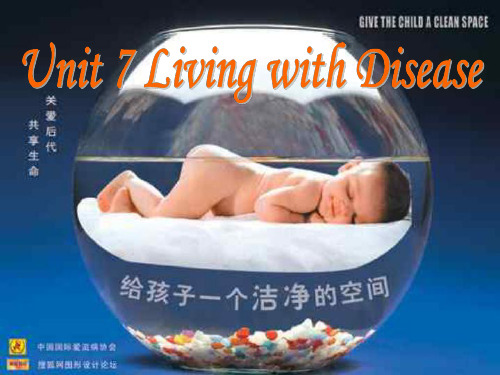
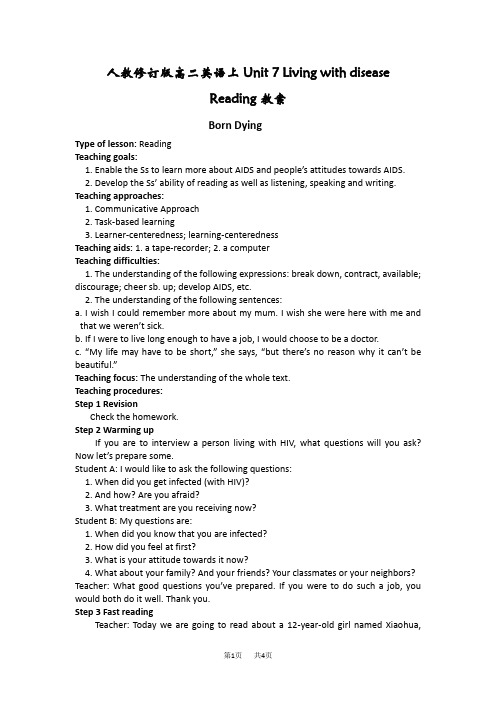
人教修订版高二英语上Unit 7 Living with diseaseReading教案Born DyingType of lesson: ReadingTeaching goals:1. Enable the Ss to learn more about AIDS and people’s attitudes towards AIDS.2. Develop the Ss’ ability of reading as well as listening, speaking and writing. Teaching approaches:1. Communicative Approach2. Task-based learning3. Learner-centeredness; learning-centerednessTeaching aids: 1. a tape-recorder; 2. a computerTeaching difficulties:1. The understanding of the following expressions: break down, contract, available; discourage; cheer sb. up; develop AIDS, etc.2. The understanding of the following sentences:a. I wish I could remember more about my mum. I wish she were here with me and that we weren’t sick.b. If I were to live long enough to have a job, I would choose to be a doctor.c. “My life may have to be short,” she says, “but there’s no reason why it can’t be beautiful.”Teaching focus: The understanding of the whole text.Teaching procedures:Step 1 RevisionCheck the homework.Step 2 Warming upIf you are to interview a person living with HIV, what questions will you ask? Now let’s prepare some.Student A: I would like to ask the following questions:1. When did you get infected (with HIV)?2. And how? Are you afraid?3. What treatment are you receiving now?Student B: My questions are:1. When did you know that you are infected?2. How did you feel at first?3. What is your attitude towards it now?4. What about your family? And your friends? Your classmates or your neighbors? Teacher: What good questions you’ve prepared. If you were to do such a job, you would both do it well. Thank you.Step 3 Fast readingTeacher: Today we are going to read about a 12-year-old girl named Xiaohua,who has been infected with HIV. How did she get infected? Is she afraid? What treatment is she receiving? What is her attitude towards it? What are other people’s attitudes? The text will tell you all.Now read it quickly and find out the answers to these questions.Questions and answersT: How did she get infected?Student C: Through birth.T: Right, thank you. Now the next one—Is she afraid?Student D: She might have been afraid at first, but not now.T: Right. How did you know that?Student D: From these sentences: 1. …but she does not let that knowledge discourage her. Instead, … 2. … but she will not let the disease destroy her happiness. Teacher: I agree. Thank you. Sit down, please. Now, Student E, is she receiving much treatment?Student E: Yes.T: How do you know that?Student E: er, er …Teacher: I’m afraid I don’t agree with you. Perhaps she is receiving some treatment, but not much. Do you agree with me, Student F?Student F: Yes.Teacher: Why?Student F: From these sentences: For children like Xiaohua there is little hope. The drugs that are available are much too expensive.T: Well done! Thank you two. Sit down, please. What are other people’s attitudes towards her, student G?Student G: Most people don’t know much about AIDS and are afraid of any contract with Xiaohua. This adds to her sufferings.T: You did a good job. Thank you.Step 4 Careful readingNow, you’ll have more time to read the text again. This time—slowly and carefully. You are to get the main idea of each paragraph and more details. Remember?Task 1 The main idea of each paragraphPara 1 A brief introductionPara 2 A general introduction to AIDSPara 3 How HIV spreadsPara 4 Thousands of children become infected with HIV every day.Para 5 There is little hope for Xiaohua, but she leads an active life and tries her best to help others.Para 6 Other people’s attitudes towards AIDS patientsPara 7 Xiaohua’s attitude towards her disease and life(Use the computer to present the answers to the students one by one.)Task 2 Questions and answersQuestions:1. What kind of disease is AIDS?2. How do people get AIDS?3. How many children became infected with AIDS in 2002 alone?4. Does Xiaohua know that she will die? Does that discourage her?5. What does she spend much of her time doing?6. What does Xiaohua mean by saying “I wish I could remember more about my mum. I wish she were here with me and that we weren’t sick.”7. What does she mean by “If I were to live long enough to have a job, I would choose to be a doctor.”8. What do you think makes AIDS patients suffer most?9. What advice does Xiaohua give to other people?10. What does Xiaohua mean by “My life may have to be short, but there’s no reason why it can’t be beautiful.”?Answers:1. It is a disease that breaks down the body’s immune system and leaves a person defenceless against infection and illnesses.2. People may get AIDS by having unprotected sex, by receiving infected blood transfusions or through birth.3. 3.2 million.4. Yes, but she doesn’t let that discourage her.5. She spends much of her limited time telling others about her disease and encouraging people to learn how to protect themselves. She goes to visit other AIDS patients to support them and cheer them up.6. She knows that all these facts can’t be changed. Her mother died too early to let her know more about her. What a pity it is that she has gone and that her and her father are both infected with HIV.7. She knows she can’t live that long. Otherwise, she would be a doctor to cure people of this disease—AIDS.8. Other people’s fear of the disease. Many people are afraid of any contact with AIDS patients for the fear of being infected.9. She suggests that people should not be afraid and give AIDS patients more care, even a hug. People should not let the AIDS patients feel lonely.10. This shows that Xiaohua is optimistic towards life despite her disease.Step 5 ListeningPlay the tape for the Ss to listen to.Step 6 ConsolidationRead aloud the text and prepare for retelling.Step 7 RetellingGet one student to retell the story of Xiaohua with the help of the following words: infected…mother…feeling … treatment … attitude … other people …One possible version:Xiaohua, a lovely Chinese girl, got infected with HIV through birth. Her mother contracted HIV at the age of 28 and died when Xiaohua was only 3 years old. Xiaohua felt sad about her disease and her mother’s death, but as she grows older, shedecided not to let that discourage her. Instead, she spends much of her time helping other people protect themselves and cheering up other AIDS patients. She also calls on the whole society to show more care, support and love to AIDS patients instead of being afraid of them. She says she’ll try to make her life beautiful. I believe she can and she will.Step 8 HomeworkRead the text again and mark out your difficulties in the text.。
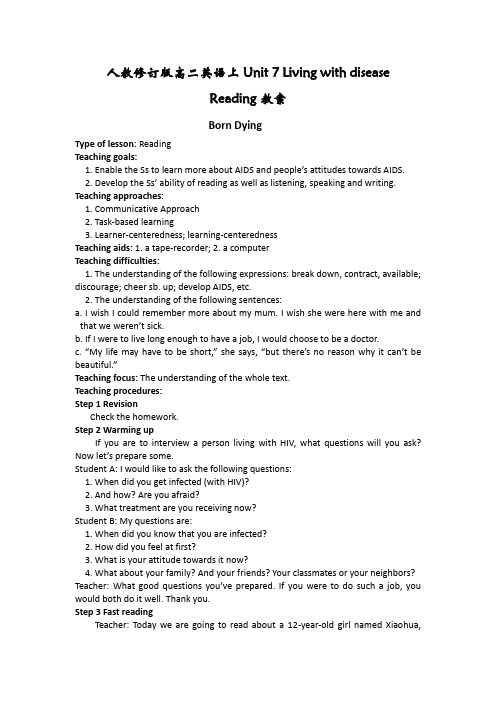
人教修订版高二英语上Unit 7 Living with diseaseReading教案Born DyingType of lesson: ReadingTeaching goals:1. Enable the Ss to learn more about AIDS and people’s attitudes towards AIDS.2. Develop the Ss’ ability of reading as well as listening, speaking and writing. Teaching approaches:1. Communicative Approach2. Task-based learning3. Learner-centeredness; learning-centerednessTeaching aids: 1. a tape-recorder; 2. a computerTeaching difficulties:1. The understanding of the following expressions: break down, contract, available; discourage; cheer sb. up; develop AIDS, etc.2. The understanding of the following sentences:a. I wish I could remember more about my mum. I wish she were here with me and that we weren’t sick.b. If I were to live long enough to have a job, I would choose to be a doctor.c. “My life may have to be short,” she says, “but there’s no reason why it can’t be beautiful.”Teaching focus: The understanding of the whole text.Teaching procedures:Step 1 RevisionCheck the homework.Step 2 Warming upIf you are to interview a person living with HIV, what questions will you ask? Now let’s prepare some.Student A: I would like to ask the following questions:1. When did you get infected (with HIV)?2. And how? Are you afraid?3. What treatment are you receiving now?Student B: My questions are:1. When did you know that you are infected?2. How did you feel at first?3. What is your attitude towards it now?4. What about your family? And your friends? Your classmates or your neighbors? Teacher: What good questions you’ve prepared. If you were to do such a job, you would both do it well. Thank you.Step 3 Fast readingTeacher: Today we are going to read about a 12-year-old girl named Xiaohua,who has been infected with HIV. How did she get infected? Is she afraid? What treatment is she receiving? What is her attitude towards it? What are other people’s attitudes? The text will tell you all.Now read it quickly and find out the answers to these questions.Questions and answersT: How did she get infected?Student C: Through birth.T: Right, thank you. Now the next one—Is she afraid?Student D: She might have been afraid at first, but not now.T: Right. How did you know that?Student D: From these sentences: 1. …but she does not let that knowledge discourage her. Instead, … 2. … but she will not let the disease destroy her happiness. Teacher: I agree. Thank you. Sit down, please. Now, Student E, is she receiving much treatment?Student E: Yes.T: How do you know that?Student E: er, er …Teacher: I’m afraid I don’t agree with you. Perhaps she is receiving some treatment, but not much. Do you agree with me, Student F?Student F: Yes.Teacher: Why?Student F: From these sentences: For children like Xiaohua there is little hope. The drugs that are available are much too expensive.T: Well done! Thank you two. Sit down, please. What are other people’s attitudes towards her, student G?Student G: Most people don’t know much about AIDS and are afraid of any contract with Xiaohua. This adds to her sufferings.T: You did a good job. Thank you.Step 4 Careful readingNow, you’ll have more time to read the text again. This time—slowly and carefully. You are to get the main idea of each paragraph and more details. Remember?Task 1 The main idea of each paragraphPara 1 A brief introductionPara 2 A general introduction to AIDSPara 3 How HIV spreadsPara 4 Thousands of children become infected with HIV every day.Para 5 There is little hope for Xiaohua, but she leads an active life and tries her best to help others.Para 6 Other people’s attitudes towards AIDS patientsPara 7 Xiaohua’s attitude towards her disease and life(Use the computer to present the answers to the students one by one.)Task 2 Questions and answersQuestions:1. What kind of disease is AIDS?2. How do people get AIDS?3. How many children became infected with AIDS in 2002 alone?4. Does Xiaohua know that she will die? Does that discourage her?5. What does she spend much of her time doing?6. What does Xiaohua mean by saying “I wish I could remember more about my mum.I wish she were here with me and that we weren’t sick.”7. What does she mean by “If I were to live long enough to have a job, I would choose to be a doctor.”8. What do you think makes AIDS patients suffer most?9. What advice does Xiaohua give to other people?10. What does Xiaohua mean by “My life may have to be short, but there’s no reason why it can’t be beautiful.”?Answers:1. It is a disease that breaks down the body’s immune system and leaves a person defenceless against infection and illnesses.2. People may get AIDS by having unprotected sex, by receiving infected blood transfusions or through birth.3. 3.2 million.4. Yes, but she doesn’t let that discourage her.5. She spends much of her limited time telling others about her disease and encouraging people to learn how to protect themselves. She goes to visit other AIDS patients to support them and cheer them up.6. She knows that all these facts can’t be changed. Her mother died too early to let her know more about her. What a pity it is that she has gone and that her and her father are both infected with HIV.7. She knows she can’t live that long. Otherwise, she would be a doctor to cure people of this disease—AIDS.8. Other peop le’s fear of the disease. Many people are afraid of any contact with AIDS patients for the fear of being infected.9. She suggests that people should not be afraid and give AIDS patients more care, even a hug. People should not let the AIDS patients feel lonely.10. This shows that Xiaohua is optimistic towards life despite her disease.Step 5 ListeningPlay the tape for the Ss to listen to.Step 6 ConsolidationRead aloud the text and prepare for retelling.Step 7 RetellingGet one student to retell the story of Xiaohua with the help of the following words: infected…mother…feeling … treatment … attitude … other people …One possible version:Xiaohua, a lovely Chinese girl, got infected with HIV through birth. Her mother contracted HIV at the age of 28 and died when Xiaohua was only 3 years old. Xiaohua felt sad about her disease and her mother’s death, but as she grows older, shedecided not to let that discourage her. Instead, she spends much of her time helping other people protect themselves and cheering up other AIDS patients. She also calls on the whole society to show more care, support and love to AIDS patients instead of being afraid of them. She says she’ll try to make her life beautiful. I believe she can and she will.Step 8 HomeworkRead the text again and mark out your difficulties in the text.。
人教修订版高二英语上Unit 7 Living with diseaseReading教案Born DyingType of lesson: ReadingTeaching goals:1. Enable the Ss to learn more about AIDS and people’s attitudes towards AIDS.2. Develop the Ss’ ability of reading as well as listening, speaking and writing. Teaching approaches:1. Communicative Approach2. Task-based learning3. Learner-centeredness; learning-centerednessTeaching aids: 1. a tape-recorder; 2. a computerTeaching difficulties:1. The understanding of the following expressions: break down, contract, available; discourage; cheer sb. up; develop AIDS, etc.2. The understanding of the following sentences:a. I wish I could remember more about my mum. I wish she were here with me and that we weren’t sick.b. If I were to live long enough to have a job, I would choose to be a doctor.c. “My life may have to be short,” she says, “but there’s no reason why it can’t be beautiful.”Teaching focus: The understanding of the whole text.Teaching procedures:Step 1 RevisionCheck the homework.Step 2 Warming upIf you are to interview a person living with HIV, what questions will you ask? Now let’s prepare some.Student A: I would like to ask the following questions:1. When did you get infected (with HIV)?2. And how? Are you afraid?3. What treatment are you receiving now?Student B: My questions are:1. When did you know that you are infected?2. How did you feel at first?3. What is your attitude towards it now?4. What about your family? And your friends? Your classmates or your neighbors?Teacher: What good questions you’ve prepared. If you were to do such a job, you would both do it well. Thank you.Step 3 Fast readingTeacher: Today we are going to read about a 12-year-old girl named Xiaohua, who has been infected with HIV. How did she get infected? Is she afraid? What treatment is she receiving? What is her attitude towards it? What are other people’s attitudes? The text will tell you all.Now read it quickly and find out the answers to these questions.Questions and answersT: How did she get infected?Student C: Through birth.T: Right, thank you. Now the next one—Is she afraid?Student D: She might have been afraid at first, but not now.T: Right. How did you know that?Student D: From these sentences: 1. …but she does not let that knowledge discourage her. Instead, …2. …but she will not let the disease destroy her happiness.Teacher: I agree. Thank you. Sit down, please. Now, Student E, is she receiving much treatment?Student E: Yes.T: How do you know that?Student E: er, er …Teacher: I’m afraid I don’t agree with you. Perhaps she is receiving some treatment, but not much. Do you agree with me, Student F?Student F: Yes.Teacher: Why?Student F: From these sentences: For children like Xiaohua there is little hope. The drugs that are available are much too expensive.T: Well done! Thank you two. Sit down, please. What are other people’s attitudes towards her, student G?Student G: Most people don’t know much about AIDS and are afraid of any contract with Xiaohua. This adds to her sufferings.T: You did a good job. Thank you.Step 4 Careful readingNow, you’ll have more time to read the text again. This time—slowly and carefully. You are to get the main idea of each paragraph and more details. Remember?Task 1 The main idea of each paragraphPara 1 A brief introductionPara 2 A general introduction to AIDSPara 3 How HIV spreadsPara 4 Thousands of children become infected with HIV every day.Para 5 There is little hope for Xiaohua, but she leads an active life and tries her best to help others.Para 6 Other people’s attitudes towards AIDS patientsPara 7 Xiaohua’s attitude towards her disease and life(Use the computer to present the answers to the students one by one.)Task 2 Questions and answersQuestions:1. What kind of disease is AIDS?2. How do people get AIDS?3. How many children became infected with AIDS in 2002 alone?4. Does Xiaohua know that she will die? Does that discourage her?5. What does she spend much of her time doing?6. What does Xiaohua mean by saying “I wish I could remember more about my mum. I wish she were here with me and that we weren’t sick.”7. What does she mean by “If I were to live long enough to have a job, I would choose to be a doctor.”8. What do you think makes AIDS patients suffer most?9. What advice does Xiaohua give to other people?10. What does Xiaohua mean by “My life may have to be short, but there’s no reason why it can’t be beautiful.”?Answers:1. It is a disease that breaks down the body’s immune system and leaves a person defenceless against infection and illnesses.2. People may get AIDS by having unprotected sex, by receiving infected blood transfusions or through birth.3. 3.2 million.4. Yes, but she doesn’t let that discourage her.5. She spends much of her limited time telling others about her disease and encouraging people to learn how to protect themselves. She goes to visit other AIDS patients to support them and cheer them up.6. She knows that all these facts can’t be changed. Her mother died too early to let her know more about her. What a pity it is that she has gone and that her and her father are both infected with HIV.7. She knows she can’t live that long. Otherwise, she would be a doctor to cure people of this disease—AIDS.8. Other peop le’s fear of the disease. Many people are afraid of any contact with AIDS patients for the fear of being infected.9. She suggests that people should not be afraid and give AIDS patients more care, even a hug. People should not let the AIDS patients feel lonely.10. This shows that Xiaohua is optimistic towards life despite her disease.Step 5 ListeningPlay the tape for the Ss to listen to.Step 6 ConsolidationRead aloud the text and prepare for retelling.Step 7 RetellingGet one student to retell the story of Xiaohua with the help of the following words: infected…mother…feeling … treatment … attitude … other people …One possible version:Xiaohua, a lovely Chinese girl, got infected with HIV through birth. Her mother contracted HIV at the age of 28 and died when Xiaohua was only 3 years old. Xiaohua felt sad about her disease and her mother’s death, but as she growsolder, she decided not to let that discourage her. Instead, she spends much of her time helping other people protect themselves and cheering up other AIDS patients. She also calls on the whole society to show more care, support and love to AIDS patients instead of being afraid of them. She says she’ll try to make her life beautiful. I believe she can and she will.Step 8 HomeworkRead the text again and mark out your difficulties in the text.。